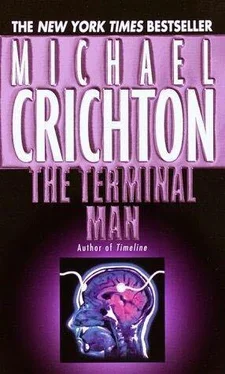Michael Crichton - The Terminal Man
Здесь есть возможность читать онлайн «Michael Crichton - The Terminal Man» весь текст электронной книги совершенно бесплатно (целиком полную версию без сокращений). В некоторых случаях можно слушать аудио, скачать через торрент в формате fb2 и присутствует краткое содержание. Жанр: Фантастика и фэнтези, на английском языке. Описание произведения, (предисловие) а так же отзывы посетителей доступны на портале библиотеки ЛибКат.
- Название:The Terminal Man
- Автор:
- Жанр:
- Год:неизвестен
- ISBN:нет данных
- Рейтинг книги:3 / 5. Голосов: 1
-
Избранное:Добавить в избранное
- Отзывы:
-
Ваша оценка:
- 60
- 1
- 2
- 3
- 4
- 5
The Terminal Man: краткое содержание, описание и аннотация
Предлагаем к чтению аннотацию, описание, краткое содержание или предисловие (зависит от того, что написал сам автор книги «The Terminal Man»). Если вы не нашли необходимую информацию о книге — напишите в комментариях, мы постараемся отыскать её.
The Terminal Man — читать онлайн бесплатно полную книгу (весь текст) целиком
Ниже представлен текст книги, разбитый по страницам. Система сохранения места последней прочитанной страницы, позволяет с удобством читать онлайн бесплатно книгу «The Terminal Man», без необходимости каждый раз заново искать на чём Вы остановились. Поставьте закладку, и сможете в любой момент перейти на страницу, на которой закончили чтение.
Интервал:
Закладка:
Morris noticed how many of them had sun tans. It had been a warm, sunny spring in Los Angeles, yet he was still as pale as the white jacket and trousers he wore every day. He had to get outside more often, he told himself. He should start eating lunch outside. He played tennis, of course, but that was usually in the evenings.
Ellis came back. "Shit," he said. "Ethel tore out her sutures."
"How did it happen?" Ethel was a juvenile rhesus monkey who had undergone brain surgery the day before. The operation had proceeded flawlessly. And Ethel was unusually docile, as rhesus monkeys went.
"I don't know," Ellis said. "Apparently she worked an arm loose from her restraints. Anyway, she's shrieking and the bone's exposed on one side.
"Did she tear out her wires?"
"I don't know. But I've got to go down and resew her now. Can you handle this?"
"I think so."
"Are you all right with the cops?" Ellis said. "I don't think they'll give you any trouble."
"No, I don't think so."
"Just get Benson up to seven as fast as you can," Ellis said. "Then call Ross. I'll be up as soon as possible." He checked his watch. "It'll probably take forty minutes to resew Ethel, if she behaves herself."
"Good luck with her," Morris said, and smiled.
Ellis looked sour and walked away.
After he had gone, the emergency ward nurse came back.
"What's the matter with him?" she asked.
"Just edgy," Morris said.
"He sure is," the nurse said. She paused and looked out the window, lingering.
Morris watched her with a kind of bemused detachment. He'd spent enough years in the hospital to recognize the subtle signs of status. He had begun as an intern, with no status at all. Most of the nurses knew more medicine than he did, and if they were tired they didn't bother to conceal it. ("I don't think you want to do that, Doctor.") As the years went by, he became a surgical resident, and the nurses became more deferential. When he was a senior resident, he was sufficiently assured in his work that a few of the nurses called him by his first name. And finally, when he transferred to the Neuropsychiatric Research Unit as a junior staff member, the formality returned as a new mark of status.
But this was something else: a nurse hanging around, just being near him, because he had a special aura of importance. Because everyone in the hospital knew what was going to happen.
Staring out the window, the nurse said, "Here he comes." Morris got up and looked out. A blue police van drove up toward the emergency ward, and turned around, backing into the ambulance slot. "All right," he said. "Notify the seventh floor, and tell them we're on our way."
"Yes, Doctor."
The nurse went off. Two ambulance orderlies opened the hospital doors. They knew nothing about Benson. One of them said to Morris, "You expecting this one?"
"Yes."
"EW case?"
"No, a direct admission."
The orderlies nodded, and watched as the police officer driving the van came around and unlocked the rear door. Two officers seated in the back emerged, blinking in the sunlight. Then Benson came out.
As always, Morris was struck by his appearance. Benson was a meek, pudgy, thirty-four-yearold man, with a sort of permanently bewildered air about him. He stood by the van, with his wrists handcuffed in front of him, and looked around. When he saw Morris, he said, "Hello," and then looked away, embarrassed.
One of the cops said, "You in charge here?"
"Yes. I'm Dr. Morris."
The cop gestured toward the interior of the hospital.
"Lead the way, Doctor."
Morris said, "Would you mind taking off his handcuffs?"
Benson's eyes flicked up at Morris, then back down.
"We don't have any orders about that." The cops exchanged glances. "I guess it's okay."
While they took the cuffs off, the driver brought Morris a form on a clipboard: "Transfer of Suspect to Institutional Care (Medical)." He signed it.
"And again here," the driver said.
As Morris signed again, he looked at Benson. Benson stood quietly, rubbing his wrists, staring straight ahead. The impersonality of the transaction, the forms and signatures, made Morris feel as if he were receiving a package from United Parcel. He wondered if Benson felt like a package.
"Okay," the driver said. "Thanks, Doc."
Morris led the other two policemen and Benson into the hospital. The orderlies shut the doors. A nurse came up with a wheelchair and Benson sat down in it. The cops looked confused.
"It's hospital policy," Morris said.
They all went to the elevators.
The elevator stopped at the lobby. A half-dozen relatives were waiting to go up to the higher floors, but they hesitated when they saw Morris, Benson in the wheelchair, and the two cops. "Please take the next car," Morris said smoothly. The doors closed. They continued up.
"Where is Dr. Ellis?" Benson asked. "I thought he was going to be here."
"He's in surgery. He'll be up shortly."
"And Dr. Ross?"
"You'll see her at the presentation."
"Oh, yes." Benson smiled. "The presentation."
The cops exchanged suspicious looks, but said nothing. The elevator arrived at the seventh floor, and they all got out.
Seven was the Special Surgical floor, where difficult and complex cases were treated. It was essentially a research floor. The most severe cardiac, kidney, and metabolic patients recuperated here. They went down to the nurses' station, a glass-walled area strategically located at the center of the X-shaped floor.
The nurse on duty at the station looked up. She was surprised to see the cops, but she said nothing. Morris said,
"This is Mr. Benson. Have we got seven-ten ready?"
"All set for him," the nurse said, and gave Benson a cheery smile. Benson smiled bleakly back, and glanced from the nurse to the computer console in the corner of the nursing station.
"You have a time-sharing station up here?"
"Yes," Morris said.
"Where's the main computer?"
"In the basement."
"Of this building?"
"Yes. It draws a lot of power, and the power lines come to this building."
Benson nodded. Morris was not surprised at the questions. Benson was trying to distract himself from the thought of surgery, and he was, after all, a computer expert.
The nurse handed Morris the chart on Benson. It had the usual blue plastic cover with the seal of University Hospital. But there was also a red tag, which meant neurosurgery, and a yellow tag, which meant intensive care, and a white tag, which Morris had almost never seen on a patient's chart. The white tag meant security precautions.
"Is that my record?" Benson asked as Morris wheeled him down the hall to 710. The cops followed along behind.
"Uh-huh."
"I always wondered what was in it."
"Lot of unreadable notes, mostly." Actually, Benson's chart was thick and very readable, with all the computer print-outs of different tests.
They came to 710. Before they entered the room, one of the cops went in and closed the door behind him. The second cop remained outside the door. "Just a precaution," he said.
Benson glanced up at Morris. "They're very careful about me," he said. "It's almost flattering."
The first cop came out. "It's okay," he said.
Morris wheeled Benson into the room. It was a large room, on the south side of the hospital, so that it was sunny in the afternoon. Benson looked around and nodded approvingly. Morris said, "This is one of the best rooms in the hospital."
"Can I get up now?"
"Of course."
Benson got out of the wheelchair and sat on the bed. He bounced on the mattress. He pressed the buttons that made the bed move up and down, then bent over to look at the motorized mechanism beneath the bed. Morris went to the window and drew the blinds, reducing the direct light. "Simple," Benson said.
Читать дальшеИнтервал:
Закладка:
Похожие книги на «The Terminal Man»
Представляем Вашему вниманию похожие книги на «The Terminal Man» списком для выбора. Мы отобрали схожую по названию и смыслу литературу в надежде предоставить читателям больше вариантов отыскать новые, интересные, ещё непрочитанные произведения.
Обсуждение, отзывы о книге «The Terminal Man» и просто собственные мнения читателей. Оставьте ваши комментарии, напишите, что Вы думаете о произведении, его смысле или главных героях. Укажите что конкретно понравилось, а что нет, и почему Вы так считаете.









